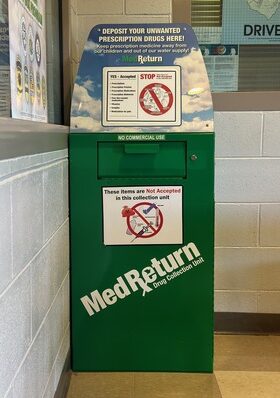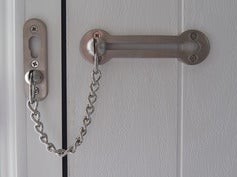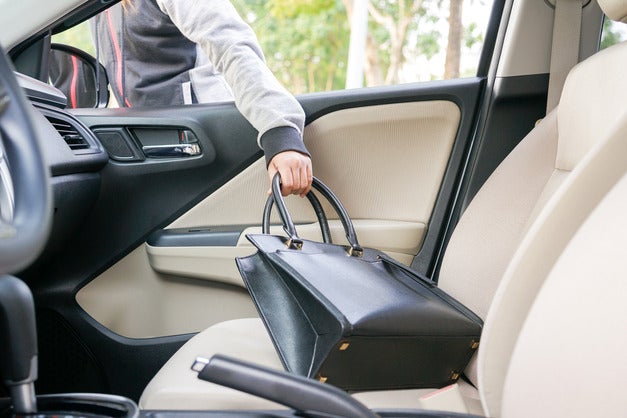Crime Prevention and Safety Tips
Active Shooter
As part of our ongoing commitment to making Hawaiʻi Island a safe place to live, visit, and conduct business, Hawaiʻi Police Department wants to prepare our community for the possibility of an “active shooter” event.
If you would like Hawaiʻi Police Department personnel to provide a free 90-minute active shooter presentation to your organization or civic club, please submit your request to the Chief’s office via email at HCPDONE@hawaiicounty.gov or call (808) 961-2244.
Surviving An Active Shooter
Resources
Businesses
Hawaiʻi Police Department is committed to working diligently on addressing agricultural theft, a frequently under-reported, yet devastating crime that impacts our island’s farmers and ranchers.
Police encourage the public to report all suspected agricultural theft incidents by calling the police department’s non-emergency number at (808) 935-3311 or filling out the form in the link below, printing it, and submitting it to police when you report an agricultural theft. Tipsters who prefer to remain anonymous may call the island-wide Crime Stoppers number at (808) 961-8300 and may be eligible for a reward of up to $1,000.
The Hawaiʻi Police Department, in collaboration with the Department of Research and Development, and the Office of the Prosecuting Attorney, has produced a fillable form that a victim of agricultural theft/trespass can prepare and leave for the responding officer.
- Report any suspicious activity to the Hawaiʻi Police Department police non-emergency line (808) 935-3311.
- Apply an anti‐graffiti coating on walls whenever possible for easy removal of graffiti.
- Where possible, control access to graffiti prone areas near your business, incorporating landscaping and/or fencing, and limiting access to roofs by thoughtful placement of dumpsters and add/or improve lighting around the building to promote natural surveillance.
Practice these tips to prevent a robbery:
- Keep your front doors and windows clear of clutter to allow two-way visibility into and out of your business.
- At night, keep the outside of your business well lit.
- Keep a minimum amount of cash in your cash register and make bank deposits often.
- Advertise outside that you keep a minimal amount of cash in the register and that you will not accept large bills.
- Use video camera surveillance and post a sign informing the public that you do so.
If you are confronted by a robber, follow these tips:
- Try to stay calm. Don’t make any sudden movements to upset the robber.
- Do exactly as you are told. Do not resist. It’s better to lose your money than your life.
- Activate your alarm only if you can do so secretly.
- Try to get a good look at the robber so you can describe him or her later. If possible, note the direction of travel when the robber leaves.
- Try to get a description of the robber’s vehicle if you can do so without exposing yourself to harm.
Hawaiʻi Police Department recognizes that homelessness is an issue that impacts the entire community. Hawaiʻi Police Department has partnered with the 808 Homeless Task Force in Kailua-Kona, the Kailua Village Business Improvement District, as well as area Neighborhood and Business Watch programs across the island. In addition, we work in collaboration with the County of Hawaiʻi Department Parks and Recreation on beautification projects in both east and west Hawaiʻi.
We understand that vagrancy issues can be challenging for local business owners and to that end have created a brochure to educate local businesses on how to address problems relating to vagrancy, trespassing, vandalism, littering, and other associated issues. The back page of the brochure lists Community Policing contact info for every district on island, should you need additional resources.
Drugs & Medications

Unused or expired prescription medications may be dropped off year-round at each of our eight district police stations as part of the State of Hawaiʻi, Department of Health’s medication drop box program.
Hawaiʻi Island police want the public to be aware of the dangers of illicit fentanyl, which has been recovered by police during drug arrests across the island.
Home & Personal Safety
- Lock your doors and windows when you leave your home. Don’t leave a house key hidden outside your home.
- Become familiar with your neighbors and their cars. Agree to watch out for each other.
- Keep your home well lit. Make sure any exterior lighting allows for 10-foot visibility and use good lighting along pathways to and from main entry points.
- Keep trees and bushes trimmed so they don’t provide cover for burglars.
- If you come home and see evidence that someone has been in your home or may still be there, leave the area and call police immediately.

Home invasion is the residential version of automobile carjacking. Most home invasions occur at nights and on weekends when homes are more likely to be occupied. The people committing this type of crime rarely work alone and rely on an overwhelming physical confrontation to gain control and instill fear in their victims.
The same tactics used to prevent burglaries will go a long way toward preventing incidents of forced entry home invasion. If home invaders can be delayed at the point of entry, then there’s a chance of deterring them and being able to call police.
Here are some prevention tips to consider:
- Have a solid-core door for all entrance points with a quality, heavy-duty deadbolt lock with a one-inch throw bolt. Use a secondary blocking device on all sliding glass doors.
- Secure all accessible windows with secondary blocking devices. Make sure someone cannot reach through an open window to unlock a door or remove a blocking device.
- Use motion sensor lights near or around key entry points.
- Identify your valuables by engraving objects with a set of numbers that only you would know, make a list of the items and their numbers and keep the list in a safe deposit box or somewhere in your home.
- Photograph items of value. If you have a smartphone, make a video of your possessions and save it to the cloud. This also comes in handy for insurance purposes in the event of a natural disaster.
The best defense against home invasion type crimes is education and planning. Have a security plan devised so that there are escape routes out of your residence or a safe location within your home. This location should have a telephone so that you are able to alert the police. If an escape route is part of your plan, make sure that everyone in the household knows where to run and what to say.
If your home is invaded, be sure to keep a cool head. Do not scream, yell out, cry or attempt any violent confrontation. Do not attempt to run or escape unless you can do so without getting hurt or caught. Do exactly as you are told — nothing more or nothing less. Do not volunteer information unless asked to do so. Without being obvious, take some time to remember the best possible description of the suspects. Remember, safety for yourself and family is paramount in this situation.
To request a home security check, call the Hilo Community Policing Lieutenant at (808) 961-2350.
The internet is a part of most of our daily lives. See tips to learn how to keep yourself safe online.
Don’t be a victim of a scam. See tips on how to prevent yourself from becoming a victim.
To reduce the threat of theft or identity theft, especially during the holiday season, follow these tips:
- When shopping, do not leave purses or bags unattended in shopping carts. All it takes is a split second for a thief to walk by, remove your bag and flee undetected. Shoppers should keep their bags or purses on their person and zipped or snapped shut.
- When paying for merchandise, be wary of openly displaying checkbooks or credit cards, as they contain vital financial information that identity thieves can write down or photograph with smart phones. If paying with cash, avoid openly displaying the contents of your wallet.
- Park in a well-lit area. When approaching your vehicle to load your purchases, keep at least one hand free to open your trunk or doors. While loading your packages, don’t leave your handbag or purse unattended.
- To eliminate drawing unwanted attention to contents in your vehicle while doing additional shopping, conceal any packages or bags so they are not visible.
- Keep your phone charged and secured on your person. In our digitally connected world, smart phones are valuable possessions containing a wealth of information. Make sure your phone is charged and password protected before you head out shopping.
Keiki (Children)
Kids and teens face an array of online risks from cyberbullying to sextortion and online enticement. Read our tips for keeping our island keiki and teens safe from online predators.
The Hawaiʻi Police Department is a committed partner in the community working toward reducing child abuse on Hawaiʻi island.
Everyone can contribute to creating a positive, nurturing environment for our children by learning and knowing a few simple facts:
- Recognize the signs of child abuse. Child abuse can be physical, emotional or sexual in nature. It can be neglectful behavior when children are deprived of basic needs, such as food, clothing and care. Child abuse can be emotional when children are isolated, rejected, berated or otherwise mistreated. Besides unexplained injuries, children can show symptoms of depression, fear, poor hygiene, difficulty in trusting others, changes in eating or sleeping patterns, hostility and other atypical behaviors. It is only when we recognize the signs of child abuse that we can begin to help the child recover.
- As parents and caregivers, we can learn to discipline children in thoughtful and caring ways. First of all, never discipline your child when you are upset. You need to give yourself time to calm down. Words and actions can inflict deep and lasting wounds. Use this opportunity to show children and other adults that conflicts can be settled without hitting, hurting or yelling.
- Get children involved in outside activities. Children learn and grow when they play or busy themselves with other positive activities. Sports, hobbies, school activities, and play time offer constructive stimulation and learning opportunities for children of all ages. Create play groups with younger children and provide encouraging support for older children to nurture this learning process.
- Get involved to help others. There is always a need in our community to become directly involved in helping children learn and grow. Become a foster parent or volunteer your time with local social service agencies or youth sports leagues. Use your skills to improve the lives of others in your community.
- Report incidents of child abuse and neglect to authorities. If you see a child being harmed or if you see evidence of abuse or neglect, report this to Child Protective Services or to the police. If a child tells you about abuse, listen to him or her carefully and assure the child that he or she did the right thing by telling an adult. Remind the child that he or she is not responsible for what happened to them.
- Know basic details: In addition to making sure your young child knows their name, also make sure they know their address and phone number in the event they become lost.
- Do not talk to strangers or accept food from a stranger. If a stranger invites you to go somewhere, get into a car to see something, or just wants to talk, say you need to ask your parents for permission first. Then go tell your parent. Never take a ride with someone without checking first with your parents.
- Do not walk out of the yard alone. Your child should know to not walk out of their yard. They should also not climb fences as there may be dogs or traffic on the other side.
- Trust your instincts. If you feel scared or uncomfortable, get away from the situation. Run away and go to a safe place.
- Teach your child that no one is allowed to touch their body. This is an important safety rule to teach keiki as soon as they can understand the basics.
Kupuna (Older Adults)
- Use strong passwords. Only share passwords with someone you have designated to manage your accounts. If you keep passwords written down, store them in an area away from your computer.
- Don’t click on links within emails, text messages, or social media from people you don’t know. Even when getting messages from friends and family, double check with the sender before clicking on a link.
- Be careful about what you post online, especially photos of young relatives such as grandchildren. There’s a chance people you don’t know can copy or share your posts on social media.
- Be cautious of urgent or coercive tactics by phone scammers: scammers often create a sense of urgency, coercing victims into immediate action. They may threaten arrest, fines, or legal consequences to pressure you into revealing personal information or making immediate payments. Take a step back, remain calm, and verify the authenticity of the call before making any decisions or taking action.
- Beware of spoofing calls. Spoofing occurs when people make it appear as if their phone calls are coming from a different number. The call recipient sees the caller ID and believes the call to be from the true owner of the number when it isn’t.
Police ask the public to be aware of callers who ask for personal information over the telephone. As a general rule of thumb, if you cannot verify the caller’s identity or you do not know who they are, do not release any personal information to them. Take steps to verify the identity of the caller. Legitimate businesses and organizations, like Hawaiʻi Police Department will never ask people to send money or buy gift cards.
Kupuna are a regular target for scams. See our tips for how to help protect yourself and your loved ones.
Terrorism Awareness
Protecting the American people from terrorist threats is the reason the Department of Homeland Security (DHS) was created and remain their highest priority. The links below provide an overview, as well as reporting procedures.
Vehicles
Some of these tips are common sense. Yet, the Hawaiʻi Police Department continuously receives reports of stolen vehicles in which the car was left running, the keys were left in the ignition or in plain sight in the console, or the car was unlocked. Simple safety will go a long way toward keeping your car secure.
- Remove your keys from the ignition and take them with you. Never hide a second set of keys in your vehicle.
- Completely close all windows and lock your vehicle.
- Never leave your vehicle running, even if you will be gone for only a minute.
- Do not leave valuables or paperwork in plain sight. Do not leave the title paperwork (“pink slip”) in your vehicle.
- Park with your wheels turned toward the curb to make your vehicle more difficult to tow.
- Place all tempting items—especially cell phones and other electronic equipment—out of sight.
- Do not leave any papers with personal information (such as mail or bank statements) in your car. Even blank papers might tempt a thief to break into your car in an attempt to steal your identity.
- Lock all doors, windows, and any sunroof before leaving your car.
- Park in a locked garage or well-lit area.
- Call police to report any suspicious activity around parked vehicles.

Unsolved Homicides
Hawaiʻi Police Department believes every victim deserves justice, and that the deceased victim’s family, friends, and community deserve closure.
Please take a moment to review the Unsolved Homicides summaries and if you have any information pertaining to any of these cases, please submit a tip, email us or call our Unsolved Homicides Division at (808) 961-2380 or Crime Stoppers at (808) 961-8300. Thank you for your help!

